Politics
EvacuationLife line. Who is helping Ukrainians to escape from under fire in the ATO zone
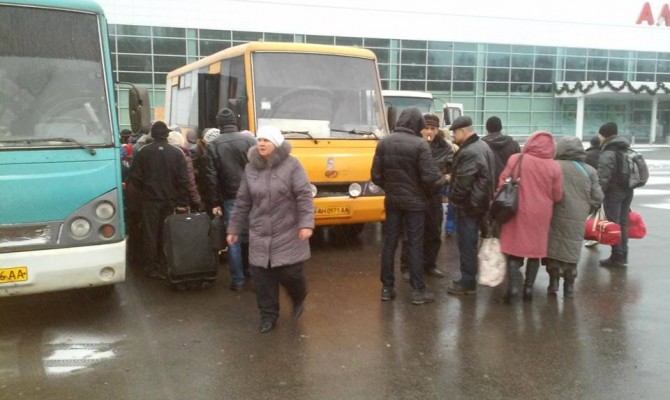
Serhiy Kosyak, a volunteer from Donetsk, has been evacuating people from the hottest spots of the ATO zone for several weeks, primarily from Avdiyivka, Debaltseve and nearby villages and also occupied Donetsk and Horlivka. On this side of the front line Serhiy’s colleagues pick up peaceful residents on their minibuses, while on the other side of the front line local transporters have to be hired as they continuously travel back and forth and officers on the road blocks know them. For the purpose of security the plate numbers of their transport vehicles are reported through the Ministry of Emergency Situations to the units of the Armed Forces of Ukraine. One trip of such bus from Donetsk costs UAH 3,500, from Horlivka – UAH 2,500. This group of volunteers spends at least UAH 11,000-13,000 a day for the evacuation of people. At the moment, the money is raised thanks to voluntary contributions.
Over the past week Kosyak and his colleagues managed to evacuate around 2,000 people. Volunteers say that they bring the majority of the displaced people to Slovyansk, from where many people travel further on their own, while others are transferred under the care of the Ministry of Emergency Situations, where train tickets are purchased for them. Part of them are sent to the transfer sites and accommodation is sought for them all around Ukraine. The other day the volunteers sent 30 people for permanent residence to Lviv and 20 – to Odesa.
By martial law
Serhiy Kosyak admits that on the side controlled by the Ukrainian army, continuous shooting is the biggest problem for the people who are being evacuated. “The most important thing is not to get yourself killed,” he says. He evacuates people from the very center of the combats and is surprised that he is still alive, though on more than one occasion he was in a situation, when it seemed that his luck ran out. Shells fell close to his car several times and the vehicle was swinging from the blasts.
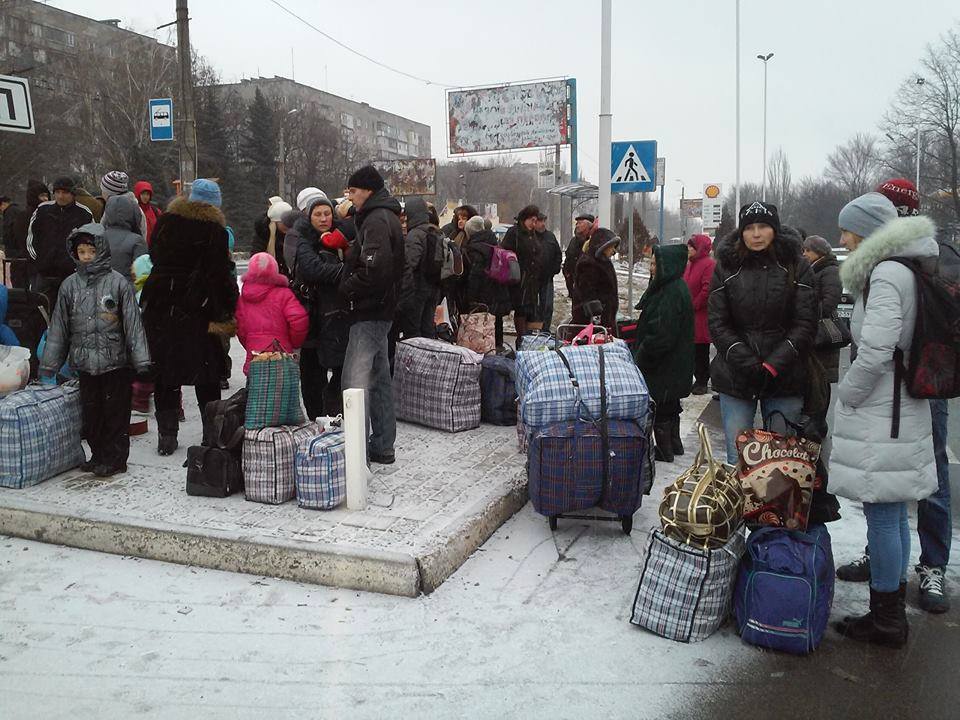
Having gathered their belongings, residents of Debaltseve escape from the city. Photo: Olena Myronova
Last week Serhiy managed to get to the village of Oktyabrskiy near Donetsk. “The village is conditionally under control of Ukraine, but in reality it is a buffer zone between the road blocks of the insurgents and Ukraine, although I have seen a Ukrainian armored vehicle on the streets. The picture there is very grim, just as everywhere in the frontline settlements,” shares the volunteer. “There were no people at the addresses I was given, while one building was completely destroyed. I met people in the street and told them that I could evacuate them. Within 30 minutes my minivan was filled with people. Some of them said that God sent me to them, because they wanted to leave, but did not know how.”
It is much easier to leave from the cities on this side of the front. Serhiy tells that the other day he traveled to Debaltseve and saw over 30 buses in the city center, which were brought by the Ministry of Emergency Situations (MES) and DPR for the evacuation of peaceful residents. “It was unusual to see vehicles with signs “MIA DPR” and “MES Ukraine” standing next to each other. The buses of MES took people to Artemivsk and Slovyansk, while DPR buses – to Donetsk. I counted around 20 big buses with signs “Evacuation Donetsk”. However, it seems people were not particularly willing to go to Donetsk, because there were only around 50 people in their buses, while there were 8 full buses traveling to Slovyansk.”
Many people from Vuhlehirsk are traveling to the occupied territory, says Kosyak. Vuhlehirsk residents say that there are practically no high-rise apartment buildings left in their hometown and there are many bodies in the streets. There are also several assembly points in Vuhlehirsk, from where people are transported to Russia or to Artemivsk, which is controlled by the Ukrainian army.
As a rule, women with children travel to their relatives on the Ukrainian side. Due to the fourth wave of mobilization few men dare to accompany them. Some manage to leave the city after several failed attempts. Kosyak recollects a story of one woman, who first tried to leave Vuhlehirsk in the middle of January. She came under fire there and had to hide in the underground passage in the cold for five hours as people were simply afraid to come out. They then tried to hide in the local church (Moscow patriarchate), but the local priest did not let them in, though there were children and elderly people with them, the woman complained. On that day she did not manage to leave the city and returned to her apartment barely alive.
Nonetheless, such unsympathetic behavior of priests is quite rare. Serhiy says that the church of the Epiphany Cathedral in Horlivka (also Moscow patriarchate), for example, has for weeks been used as a shelter during the shootings. “So it turns out that it is one organization, but the priests are different,” he sums up.
One-way ticket
At the moment, it is quite problematic to escape from the occupied territory to Ukraine. The passage system that was introduced on January 21 added troubles for all such people. At that, there are practically no problems with representatives of DPR; they let the buses pass, admit volunteers. As for the Ukrainian road blocks, situations differ. For example, it is practically impossible to transport people through the road blocks in Volnovakha and Kurakhove. “This passage system is torture, because it is impossible for people to leave,” complains Serhiy. “For instance, 2,000 people come to register a permit to leave in Artemivsk every day. Just imagine that they must travel to the first road block on the border with the occupied territory and submit an application, and then 10 days later come and obtain the permit. But what if the person no longer has a home. The shootings are everywhere. It is crazy and it violates the Constitution. The government then should simply announce that it does not consider the people living on the occupied territories citizens of Ukraine, because they should have the right to move freely on the territory of their own country. The task of the government is not to prevent, but to ensure that these people can move freely.”
The road blocks with servicemen of AFU only are easy to pass. The soldiers there check passports and let you through. However, on the road blocks with police, customs officers, border guards additional check-ups begin – they may demand the power of attorney for driving a vehicle, insurance policy, etc. A driver of one of the buses tells that he once came upon such inspector and when women with children started to cry and ask: “What are you doing; our homes have been bombed, there is shooting everywhere, we need to leave!”, the representative of the law enforcement bodies announced: “I have no time to watch this whining.” He did not let the bus through.
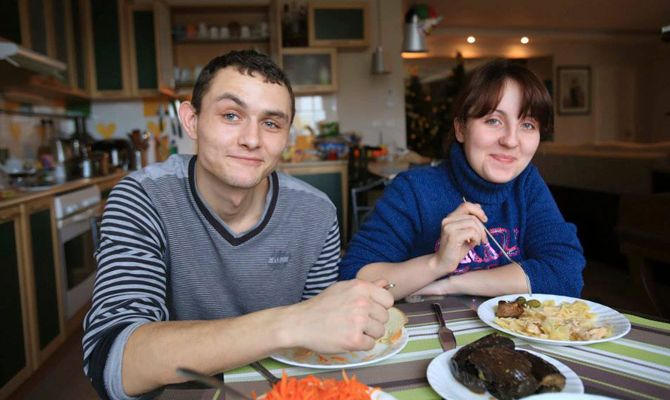
Volodymyr and Maria Pyvovar. Photo: Maya Mykhalyuk
As it was to be expected, the passage system resulted into corruption. People are charged UAH 400 for free exit from the occupied territory. In places issuing permits people bring the bribes to those responsible for issuing them in order to quickly obtain the document, complain volunteers.
Anger and distrust of people is yet another problem. Even those who bring help may face aggression. Volunteers, however, say that basements differ. There may be very angry people in one basement, particularly if there is one negative person in there who spreads his anger onto others. If there is no such person, the people are better disposed to help. However, many still believe that they will stay under fire and just wait for the combat actions to stop. Volunteers are mostly concerned that parents refuse to evacuate their children.
Twice refugees
Hundreds thousands people in Donetsk and Luhansk oblasts were forced to leave their homes. The majority try not to travel too far from their homes. However, the war may play a bad joke with them and catch up even where it seemed safe a week ago. The most desperate people cut all ties with their home, understanding that it is best to start a new life in a place where war cannot catch up with them. Pyvovar family first tried to escape from Yenakiyevo to Artemivsk, but with no success. They then decided to escape further – to Cherkasy.
Maya Mykhalyuk, coordinator of the volunteer group Kryla Shchedrosti ta Turboty (Wings of Generosity and Care), tells that one evening she was approached by an acquaintance of hers with a request to help evacuate a young couple. The family had a two-year old daughter and the woman was soon to give birth to her second child. “At first this task seemed impossible,” tells Maya. “I posted on our Facebook page and, you won’t believe it, three minutes later a person wrote back that he was ready to take them. Six hours later he was already on the road.”
The family was safely brought to Kyiv and then sent to Cherkasy, where the local volunteers helped find an apartment. Volodymyr Pyvovar, a former miner, shared a story of his family: his mine was destroyed by a bomb in his native Yenakiyevo; he was jobless for over six months and in summer they were forced to move to the basement. “Only the ambulance and morgues still operate in Yenakiyevo,” adds his wife Maria. “It is impossible to see a doctor, have some tests or the ultrasound, as all doctors left. I was told that there were no chemical agents available to run the test. Then I was offered to write with a pencil that I was healthy. And I’m due in February.”
They lived in the basement in Yenakiyevo for a month. Their two-year old Valeria had lice because of the dampness and absence of any conditions. They had to cut her long hair. The girl now has short hair and looks more like a boy. Maria says that it was unbearable to live in the basement with a little child. “She wants the swings, to jump and run and suddenly there are shells flying over you and you snatch her from the swing and don’t know what to do next – to run or to drop to the ground. We taught her that when the shooting starts she stays still and looks at us. You tell her: “Quick, here!” and she runs to you and clings to your leg. The woman says that in six months they received two food rations from Akhmetov Fund in Yenakiyevo and she had to stay in line for over ten hours to get them. Once Maria received an allowance from DPR – UAH 500, also after standing in a long line. “I took the money, looked at it and thought with tears in my eyes “what it will be enough for and what should I do next?”. The Pyvovar family is convinced that the people have no prospects on the occupied territories, because the infrastructure has been destroyed, there is no work and even if somebody has any money, it is enough only to buy bread. “We were told that everything will be back to normal. The people were told to restore shops and pay taxes,” tells Volodymyr. “People ask DPR representatives: how do we do it? And they answer: in any way you want. They raised prices for housing utility services. Discontent is quickly suppressed. They say: if you don’t like anything you are free to leave. If you try to express your discontent, we will help you leave.”
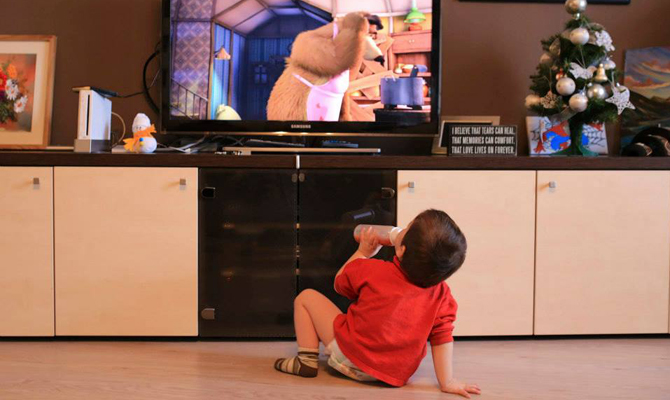
Two-year old Valeria Pyvovar. Photo: Maya Mykhalyuk
Pyvovar family first moved from Yenakiyevo to Artemivsk. However, peaceful life quickly ended there too. “There are combats several kilometers away,” says Maria. “The child has just begun to forget the shootings. We thought that we would not be able to hide in the basements again, now with two children, one of which is an infant. If there is a choice to leave and start from scratch, it is best to do it further away from the war, than to sit at home and not know whether tomorrow will come and whether you survive another night.”
Maria and Volodymyr were most surprised at how quickly the people who were ready to help them move were found. They are not accustomed to that. “There was a full-scale operation on our evacuation,” smiles Volodymyr. “People here are different; our people there are angry and aggressive; you cannot communicate much with them, let alone ask about something. Everybody defends their own interests and everybody is used to it. Only neighbors, who know us, helped us.” Volodymyr admits that at first he was skeptic about his wife’s attempts to evacuate with the help of volunteers. Now, if they had the opportunity, they would advise all their friends on the front line to have a little more trust in people.
Mykhalyuk says that Pyvovar family is only one case and one story of the hundreds and thousands of people needing help. “Abundance of information about the displaced people has had an anesthetic effect on us; we do not feel the urgency; in a sense it seized to be personal, because there are so many people,” she continues. “And then we came across a concrete family: Masha, Volodymyr, their small child Valeria and their soon-to-be-born baby and the problem became specific and many people expressed their will to help.” Thanks to volunteers the family safely got to Cherkasy and in the end of last week Maria gave birth to a baby boy.
Meanwhile, the news from Debaltsevo are disconcerting. Kosyak says that his group of volunteers could not get to the city today. Debaltseve-Artemivsk stretch of the highway was blocked by the separatists. “Entry and exit have been blocked,” says Kosyak, adding, “This is very bad.” The road via Novohryhoryivka, which s still controlled by the Ukrainian army, is the only one available. It seems that the separatists are preparing for the new round of negotiations in Minsk in such a way. Serhiy Kosyak, it seems, is more concerned about the people remaining in the city, rather than about the outcome of the negotiations. “I don’t know if they manage to agree to let through food and water supplies to Debaltseve. The people there will not be able to survive without water there for more than a week,” he says.


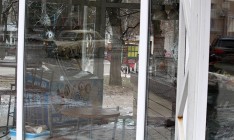
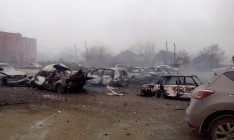
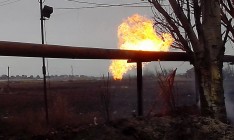

 of the agreement of syndication with Financial Times Limited are strictly prohibited. Use of materials which refers to France-Presse, Reuters, Interfax-Ukraine, Ukrainian News, UNIAN agencies is strictly prohibited. Materials marked
of the agreement of syndication with Financial Times Limited are strictly prohibited. Use of materials which refers to France-Presse, Reuters, Interfax-Ukraine, Ukrainian News, UNIAN agencies is strictly prohibited. Materials marked  are published as advertisements.
are published as advertisements.